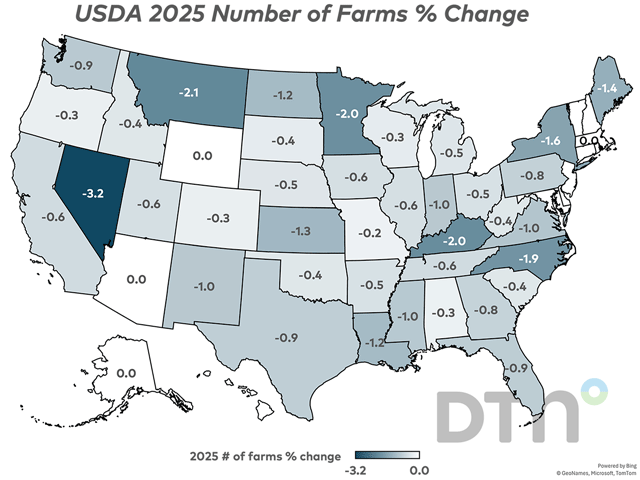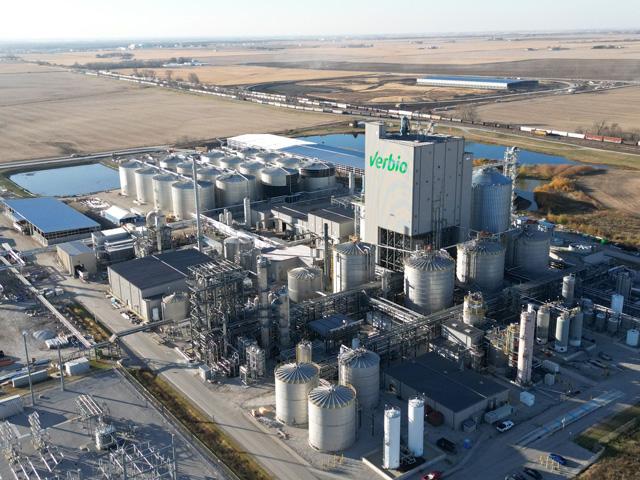Renewable Natural Gas From Corn Stover
Failed Cellulosic Ethanol Plant Became North America's Largest RNG Producer
NEVADA, Iowa (DTN) -- When DuPont shut down its cellulosic ethanol plant in 2017 after years of effort and $225 million in investment, it looked like the process of converting corn stover to renewable energy was a failure.
Then the Germans took over.
In 2018, Verbio North America Corp., a subsidiary of Verbio Vereinigte BioEnergie AG in Germany, bought the plant from DuPont and began its conversion. Verbio, though, wasn't looking at cellulosic ethanol, but saw an opportunity instead to convert corn stover to renewable natural gas (RNG).
"We were never interested in the cellulosic ethanol portion of things," said Holly Schnur, director of marketing and communications for Verbio North America. "At the time, the economics of it just did not make sense, so the intent was always to bring the RNG technology from Germany over."
DTN got a glimpse of Verbio's facility and processing earlier this month during a brief tour of the facility as part of an Iowa Smart Ag event in central Iowa.
While other renewable natural gas (RNG) producers are converting dairy manure or landfill waste into RNG, Verbio is using about 100,000 tons of corn stover in its process, making it a unique producer for RNG in the North American market. Verbio now champions the facility as North America's largest industrial renewable natural gas plant.
"Our chief competitors right now are dairies, landfills and things like that," Schnur said. "There's definitely value added there, but they're on a much smaller scale. At this point, our plant is one of a kind in the U.S."
GERMAN BLUEPRINT
The operations in Nevada come from a German blueprint. Verbio has three similar RNG facilities in Germany producing as well as a couple of biodiesel plants. "We are serial No. 1 for the North American side of things; however in Germany this is a well-established process. They know what they're doing."
In May, Verbio also bought South Bend Ethanol in Indiana and announced a $230 million upgrade for the plant. Verbio will follow the process set up in Iowa to produce 2.8 billion cubic feet of RNG in Indiana and 85 million gallons of ethanol production as well.
Verbio, though, has international competition coming aggressively into the U.S. RNG market because of the stacks of state and federal incentives that are driving more production growth for renewable natural gas, also called biomethane.
Verbio started processing RNG in late 2021 from stover stacked up around central Iowa for the DuPont facility. Verbio built two stover buildings that combined can store more than 100,000 bales. This year, the company stated it has signed contracts with farmers for at least 26,000 acres to collect stover from the fields.
Schnur noted Verbio doesn't clean cornfields of residue, but takes one-third to half of the stalk residue on the field, leaving some substantial carbon and erosion reduction in place.
P[L1] D[0x0] M[300x250] OOP[F] ADUNIT[] T[]
Verbio has 16 grain-bin sized methane-digester tanks on site fed with bacteria from local cattle manure. The process feeds stover into the tanks that is stirred and kept warm and the bacteria breaking down the stover produces the methane.
"We chop the bales and we get them to a fine powder, we slurry them, we push them into the digesters and it's like the baby formula that keeps the bacteria fed and happy," Schnur said "So they feed on the bacteria and that produces methane gas that rises to the top of the structure."
Because Alliant Energy has a natural-gas line running near the facility, Verbio doesn't have to store the gas it generates. Using a proprietary refining process, Verbio cleans the RNG to Alliant's specifications and then pushes it directly into the pipeline.
Schnur said the power equivalent from Verbio's natural gas equates to about 80 megawatts of power, which is enough power for more than 13,000 homes.
Along with the RNG, Verbio also is recommissioning the ethanol plant on site to a 60-million-gallon corn ethanol facility that right now is set to start processing just around harvest time.
"So, farmers will be bringing us corn, hopefully in the third quarter, if not sooner," Schnur said.
While a typical ethanol plant will produce dried distiller's grain for livestock feed, Verbio won't dry the distilled grain but will instead feed it to a second set of digesters to produce more RNG. Verbio plans to use that strategy in both the Iowa and Indiana plants. The end result will also be a liquid fertilizer by-product that Verbio will end up marketing.
RNG BYPRODUCT: HUMUS
Another byproduct from the methane digestion is tons of humus that looks just like a mulch product people buy at a gardening store. Verbio is starting to offer the humus as a soil conditioner for producers in the area, especially those who provide stover. Schnur said Verbio staff are trying to educate farmers about the benefits of applying the humus to their fields.
Trying to introduce the humus to producers, Verbio will truck and spread it for $22 a ton and producers with trailers can pick it up at the plant for $7 a ton.
"It has all of the same N, P and K values that come off the corn stover. It's essentially the equivalent of what came off the field, but it's in a much more usable form," Schnur said. "So, what we do is we give that back to the growers and redistribute it back onto the field so that crop nutrition doesn't leave the soil if the farmer chooses to use the humus."
"We're wanting to let producers know what we have and we're not being greedy about it," she said.
INDUSTRY RUSH FOR INCENTIVES
The group called the RNG coalition cites there are now 281 operation RNG facilities around the country with another 180 under construction and 296 on the drawing board. If all come to fruition, there could be more than 750 RNG facilities before the end of the decade. In comparison, there are about 200 ethanol plants nationally. Most RNG facilities now capture methane from municipal waste landfills, but dairy and swine operations are growing as well.
The players in the industry are getting larger, too, with companies such as BP, Shell, Chevron and Enbridge buying up smaller companies and announcing their own RNG projects.
The suite of federal incentives for renewable natural gas was expanded last year with the Inflation Reduction Act (IRA). In buying the Indiana plant, Verbio pointed to the 30% Energy Investment Tax Credit in the IRA as one of the opportunities that could boost the rate of return for the facility by more than 10%.
Under the Renewable Fuels Standard, RNG can qualify as an advanced biofuel and qualify for both D-3 and D-5 Renewable Identification Number (RIN) credits. In California's low-carbon fuel standard (LCFS), renewable natural gas has one of the lowest carbon-intensity (CI) scores of any fuel. Renewable diesel, for instance, has an LCFS score of around 35. A typical corn-based ethanol plant will have a CI score in the 60s or 70s. RNG has an average score below -100 and can go as low as -600, according to California Air Resources Board pathway data.
California LCFS credits right now are averaging just under $83 per metric ton of carbon dioxide equivalent displaced.
If used for power generation, RNG also can qualify for the Production Tax Credit.
With RNG production, Verbio will have the energy necessary to produce ethanol, make it more efficient and lower the CI score for the ethanol produced at the facility.
On the carbon intensity score, "It's a little bit of a moving target, but I do know we have met the standards to be able to market into that California market if we choose to," Schnur said.
Monte Shaw, executive director of the Iowa Renewable Fuels Association, said there were concerns about what would happen to the Nevada facility after DuPont shut it down. He said few people knew much about Verbio when the company stepped in. There's now an education process going on about RNG as well.
"We're learning about renewable natural gas so I don't have my finger on that issue as a whole," Shaw said. "I know a lot of municipal-waste facilities are doing it and you have some dairies, but I have not heard of anybody else using crop residue to produce RNG."
Shaw recalled when one of Verbio's German leaders came to Iowa and gave a speech about the company and its process. "He definitely wants to have many, many projects in the U.S. and according to him they have the capital to do it. So, it will be interesting to watch going forward."
Also see, "Verbio Buys South Bend Ethanol Plant," https://www.dtnpf.com/…
Chris Clayton can be reached at Chris.Clayton@dtn.com
Follow him on Twitter @ChrisClaytonDTN
(c) Copyright 2023 DTN, LLC. All rights reserved.




